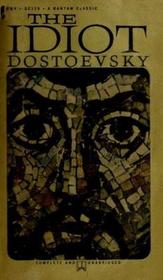This book could've been just as complex & beautiful if it lost about 200 pages. Lots of characters, lots of grand oratory speeches from individual characters, yet the ending in the last 50ish pages seemed rushed & didn't give much insight into the "after" impact of the big event on the main characters.
A very deep read. I would not recomend this to anyone who has trouble keeping many characters sorted in their mind as they read. Fyodor is a brilliant writer, but this should be read straight through or there is no way you'll keep all the names in this story from becoming a mob of seperate short stories.
I liked this book more than Crime and Punishment. Fyodor Dostoevsky is truly good at portraying people in a unique way. You can't help but feel sorry for the prince, and despise him, and love him all at the same time.
You must read this book
"My intention is to portray a truly beautiful soul" Dostoevsky.
From his reslove emerged the character of prince myshkin, the saint-like man whose rare goodness evokes as much mistrust as love in a society more concerned with wealth, power and sexual conquest than the ideals of christianity. Myshikins disintegration, reinforced by his daily increasing awareness of human misery is final proof of the inability of any man to bear the burden of moral perfection in an imprefect world.
From his reslove emerged the character of prince myshkin, the saint-like man whose rare goodness evokes as much mistrust as love in a society more concerned with wealth, power and sexual conquest than the ideals of christianity. Myshikins disintegration, reinforced by his daily increasing awareness of human misery is final proof of the inability of any man to bear the burden of moral perfection in an imprefect world.




